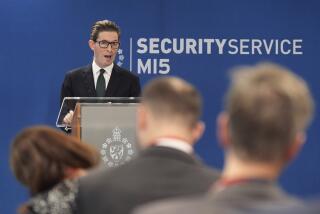Britain on alert after airport is hit
- Share via
LONDON — Two men crashed a sport utility vehicle into the main terminal of Scotland’s Glasgow international airport Saturday, a fiery attack that authorities said was linked to the two car bombs left the day before in London’s crowded nightclub district.
Two suspects were detained and one was hospitalized in critical condition with severe burns. One bystander suffered a leg injury, but no serious casualties were reported among travelers and employees on one of the busiest summer vacation travel weeks.
The Jeep Cherokee exploded at the glass entrance to the terminal, sending people running for safety -- images caught on mobile telephones.
“It was an inferno -- flames about 35 to 40 feet,” airport employee Thomas Conroy said.
Late Saturday, Scottish police said they had discovered links with the car bombs found Friday in London. Early today, London’s Metropolitan Police said counter-terrorism officers had arrested two people on the M6 highway in northern England in connection with the Glasgow and London incidents.
Britain raised its national security rating to “critical,” the highest level, indicating that another attack was expected. Liverpool’s John Lennon Airport was closed, although it was not clear whether there were any specific threats. Security also was increased at U.S. airports.
“I can confirm that we believe the incident at Glasgow Airport is linked to the events in London,” Strathclyde Police Chief Constable Willie Rae told reporters. “There are clearly similarities, and we can confirm that this is being treated as a terrorist incident.”
Rae said police had had no intelligence suggesting that Scotland would be targeted. He said “a suspect device was found” on one of the detained men while he was being taken to Royal Alexandra Hospital in nearby Paisley. Strathclyde police said early today that explosives experts had determined the device was safe and not a suicide belt, as the media had speculated.
Frank Gardner, security correspondent for the BBC, reported that the vehicle used in the Glasgow attack, like those discovered in London, was packed with containers of gasoline and propane.
Links to Al Qaeda seen
No group has claimed responsibility for the Glasgow and London bombing attempts, but anti-terrorism officials said they appeared to be connected to or inspired by Al Qaeda, given their similarity to half a dozen other attacks and plots in Britain in recent years. In two cases in which Al Qaeda-linked operatives were convicted in London this year, one involved a plot calling for the use of gasoline-filled vehicles and another the targeting of a trendy nightclub, officials said.
There was much speculation as to the timing of the events, coming just days after Prime Minister Gordon Brown, who is from Scotland, took office and near the second anniversary of the suicide attacks on the London transport system that killed 52 people.
On Friday, police discovered two Mercedes sedans packed with propane, gasoline and nails in central London. Both were left near Piccadilly Circus, the heart of the theater and tourist district. One was found outside the Tiger Tiger nightclub and another in an underground parking lot several blocks away, where it had been towed to from a no-parking zone.
Scotland Yard said police were conducting “painstaking trawls” of footage from the city’s extensive surveillance camera network and combing evidence from the unexploded car bombs, including a mobile telephone, to track down the would-be bombers.
“They have a ton of material from CCTV and forensics that they are working,” said a British counter-terrorism official who spoke on condition of anonymity.
The Glasgow Airport attack occurred about 3 p.m. Saturday at the start of the summer travel season. The sport utility vehicle caught fire on impact, said Rae, the Strathclyde police chief.
One witness described one of the suspects as “Asian,” which in Britain usually refers to Pakistani and other South Asian immigrants, and another said he heard one of the suspects shouting, “Allah, Allah.”
“This Jeep crashed into the terminal and there was the Asian male, he was lying on the ground and he was on fire,” Stephen Clarkson told BBC. The suspect, he added, “stood up and started fighting with the police and the airport officials, and I managed to knock him to the ground, and the police got on top of him ... and restrained him.”
John Smeaton said he also tried to get ahold of the suspect fighting with police. “He was throwing punches and shouting, ‘Allah, Allah,’ ” Smeaton said.
Late Saturday night, Rae said the burned vehicle was “in a highly unstable condition.” But early today police said the vehicle presented no further danger and would be removed for forensic tests. The airport remained closed, and scores of passengers were still stranded on aircraft parked on the tarmac for safety reasons.
In London, Prime Minister Brown held two meetings of his interdepartmental emergency response committee, one before and one after the Glasgow attack. They were attended by new Home Secretary Jacqui Smith and top-ranking security officials.
After the London car bombs were discovered, but before the Glasgow attack, summer events proceeded as planned. A gay pride march with floats and performers wended its way through the reopened Piccadilly Circus, and Wimbledon tennis matches continued. Promoters said a Sunday night concert in honor of Princess Diana organized by her sons, Prince William and Prince Harry, would be held.
‘Low-scale attacks’
The attempted strikes in both London and Glasgow had amateurish aspects, according to anti-terrorism officials and experts.
“It seems what we saw here are low-scale attacks that are easier to orchestrate than something such as an aviation attack,” said Sajjan Gohel of the Asia-Pacific Foundation, a security think tank in London. “The London plot was amateurish, they seem to have done little reconnaissance. The device may have not been rigged up properly.”
Nonetheless, the plots had deadly potential and may well have had links to serious networks, Gohel said.
“Because a terrorist fails, we somehow go into our comfort zone, but that doesn’t stop the possibility that it was related to Al Qaeda central,” he said. “And we have seen that Al Qaeda central learns from its mistakes.”
Islamist terrorist networks are a threat all over Western Europe. But with the exception of the Madrid train bombings that killed 191 people in 2004, Britain has faced the most sophisticated plots. Experts say that is because of the intensity of radicalism in the country’s multiethnic Muslim community and the longtime presence of key extremist clerics. Moreover, scores of British men of Pakistani origin have been able to acquire training and direction from networks operating in Pakistan.
Recurring patterns
Western counter-terrorism investigators and trials have connected the core leaders of Al Qaeda, believed to be hiding in the Pakistani-Afghan border region, to a series of interrelated plots in Britain.
Those include a foiled plot to blow up U.S.-bound planes in midair last year, the attacks on the London transport system in 2005, and a 2004 plot by Britons of Pakistani origin to bomb a nightclub and shopping malls that led to five convictions in May.
In addition, Dhiren Barot, described by prosecutors as a close associate or member of Al Qaeda, was convicted in November in a plot to use gasoline-filled limousines as rolling bombs in London as well as planning attacks on financial institutions in the New York area and in Washington.
In Britain and elsewhere, Al Qaeda-linked networks often return to the same targets and methods. Officials noted that the gasoline-based bombs in the two older-model Mercedeses found in London were similar to those outlined by Barot in his meticulous planning documents. The Glasgow attack recalls intelligence developed in 2002 by British investigators about plans to drive gas-filled vehicles into subway stations and other targets.
Investigators also pointed out that the Mercedeses’ bombs appeared to target Tiger Tiger, a large and trendy nightclub, during a crowded ladies night. That raises parallels to the May convictions, in which wiretaps caught suspects talking gleefully about blowing up women dancing in the large Ministry of Sound nightclub.
“What about easy, easy stuff where you don’t need no experience?” said Jawad Akbar, 23, a student whose room was bugged by police.
The tape was played in court last year. “You could get a job like this, for example, the biggest nightclub in central London where no one could ever turn around and say, ‘Oh they were innocent,’ those slags dancing around. If you went for the social structure where every Tom, Dick and Harry goes on a Saturday night, yeah, that would be crazy, crazy thing, man.”
Evidence presented in court established that the suspects had trained in Pakistan and received orders from Al Qaeda leaders.
Times staff writer Marjorie Miller in Paris contributed to this report.
More to Read
Sign up for Essential California
The most important California stories and recommendations in your inbox every morning.
You may occasionally receive promotional content from the Los Angeles Times.













